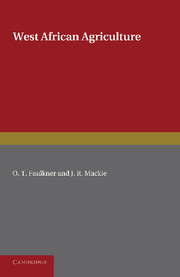Chapter 5 - Shifting Cultivation
from PART I - GENERAL
Published online by Cambridge University Press: 05 June 2016
Summary
The practice known as “shifting cultivation” is almost universal throughout the whole of West Africa. Under this system the farmer clears a piece of land, crops it intensively for three or four years and then allows it to revert to bush again until it has regained its fertility, meanwhile clearing another area of bush land in order to make a new farm. The resting period may be anything from one year upwards, depending on the density of the population and consequent demand for land; but the commonest period is about four or five years. The continuance of such a system depends therefore upon abundance of land, and hitherto this condition has existed generally in West Africa. But there are large areas in Nigeria where it no longer exists and, with an increasing population and an expanding demand for the produce of tropical countries, it can only be a question of time before a shortage of land becomes more general.
The native does not deliberately destroy trees whose fruits are of economic value, but, when land is cleared for farming, such trees, especially young oil palms, receive a check to their growth, which is often quite deliberately given by heavy scorching and by the cutting off of many leaves. Even the stumps of valueless trees and large bushes are not destroyed; but their regrowth is checked temporarily by regular lopping so long as the land is in cultivation. The stumps of the bushy under growth have a great value in ensuring that, when land in due course reverts to fallow, it shall be a fallow of secondary bush rather than one of grass and annuals; for the former type seems to lead to a greater recovery of fertility, and also has the advantage that when the land is again cleared it is not infested with weeds.
Where there is high forest still available, it is preferred for cultivation to any secondary bush, so that shifting cultivation in such areas entails the continual destruction of forest, which is valuable both for its timber and for its effect on climate. In these circumstances shifting cultivation is obviously most wasteful.
Information
- Type
- Chapter
- Information
- West African Agriculture , pp. 43 - 49Publisher: Cambridge University PressPrint publication year: 2013
